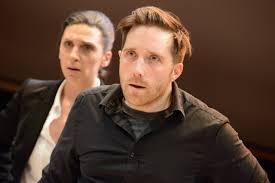It Just Stopped (Orange Tree Theatre)

© Robert Day
The UK premiere of Australian Stephen Sewell‘s apocalyptic satire It Just Stopped raises a number of intriguing questions: does Australia still need to import its intellectuals? Which of Melbourne’s only three residential skyscrapers of this height is the play actually meant to be set in? And how can a pair of journalists possibly afford to live anywhere near the summit of one of these buildings? Unfortunately these are probably not the questions the audience are intended to take home with them, but hey-ho at least they offer something for a reviewer to get his teeth into.
New York sophisticates Franklin (Joseph Kloska) and Beth (Emma Pallant) live on the 47th Floor of a luxury apartment complex. They wake up one morning to discover the power in their building has failed, the phones are dead, no one is broadcasting over any radio frequency and some malign obstacle has rendered the stairs impassable. As the couple panic over how to survive the advent of a technological apocalypse, they are interrupted by the Australians who live on the floor above – the yobbish cardboard box magnate Bill (John Bowler) and his equally ghastly wife Pearl (Cate Debenham-Taylor).
Director David Antrobus and his cast put together a number of energetic set-pieces that allied to some smart lighting effects, just about keep the work moving. Joseph Kloska, though slightly miscast as a fidgety critic determined to forgive Wagner’s anti-semitism, wheedles and nags with comic intensity; while John Bowler gives a wonderfully intimidating performance as a bully whose boorishness disguises a cunning mind. Emma Pallant is also a lively presence, though her New Jersey accent seems a strange choice. However both she and Cate Debenham-Taylor (whose part is terribly underwritten) are denied any intelligent lines. When the play finally gets beyond establishing its premise and attempts a discussion of the nature of art – the women have to clear the stage, while the men argue fundamentals.
In spite of the crew’s best efforts they can’t rescue a play whose premise, characters, philosophy, jokes and dramatic tricks always seem to slide from the acceptably broad into the tediously crass. Post-apocalyptic stories need credible protagonists to keep the action grounded, but here no one is real. Bill apart, they neither communicate, nor behave in a way that is remotely believable. When Franklin remarks, ‘Of course, we’re above it, we’re from Harvard’ – not only would you never have guessed – but it seems like a comic aside from an entirely different play, from an entirely different continent.
Though there is some cleverness in the final exchanges, as the play deconstructs its opening act, it all comes too late. By this point my patience, not to mention my date, had already done what the characters couldn’t, and left the building.










